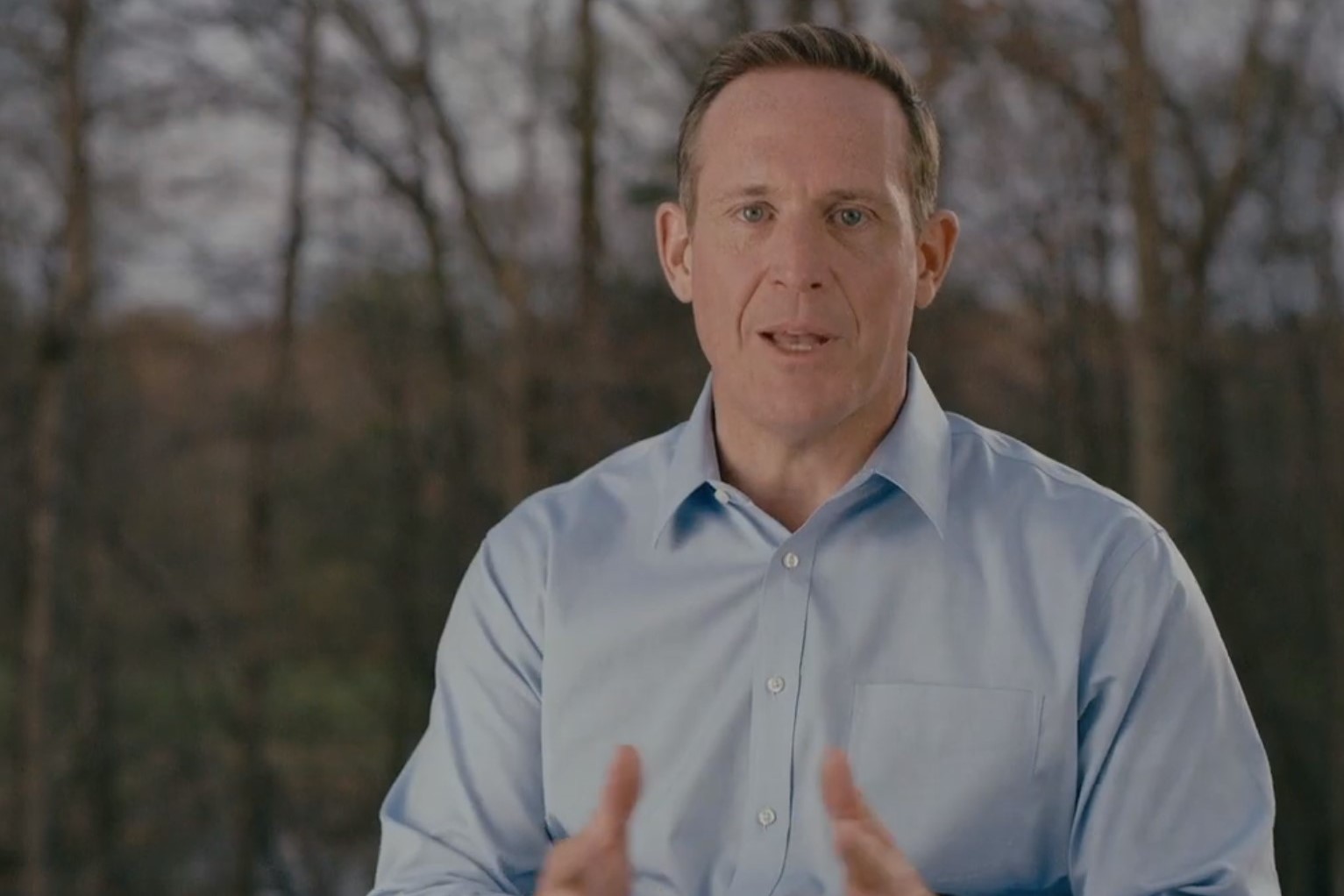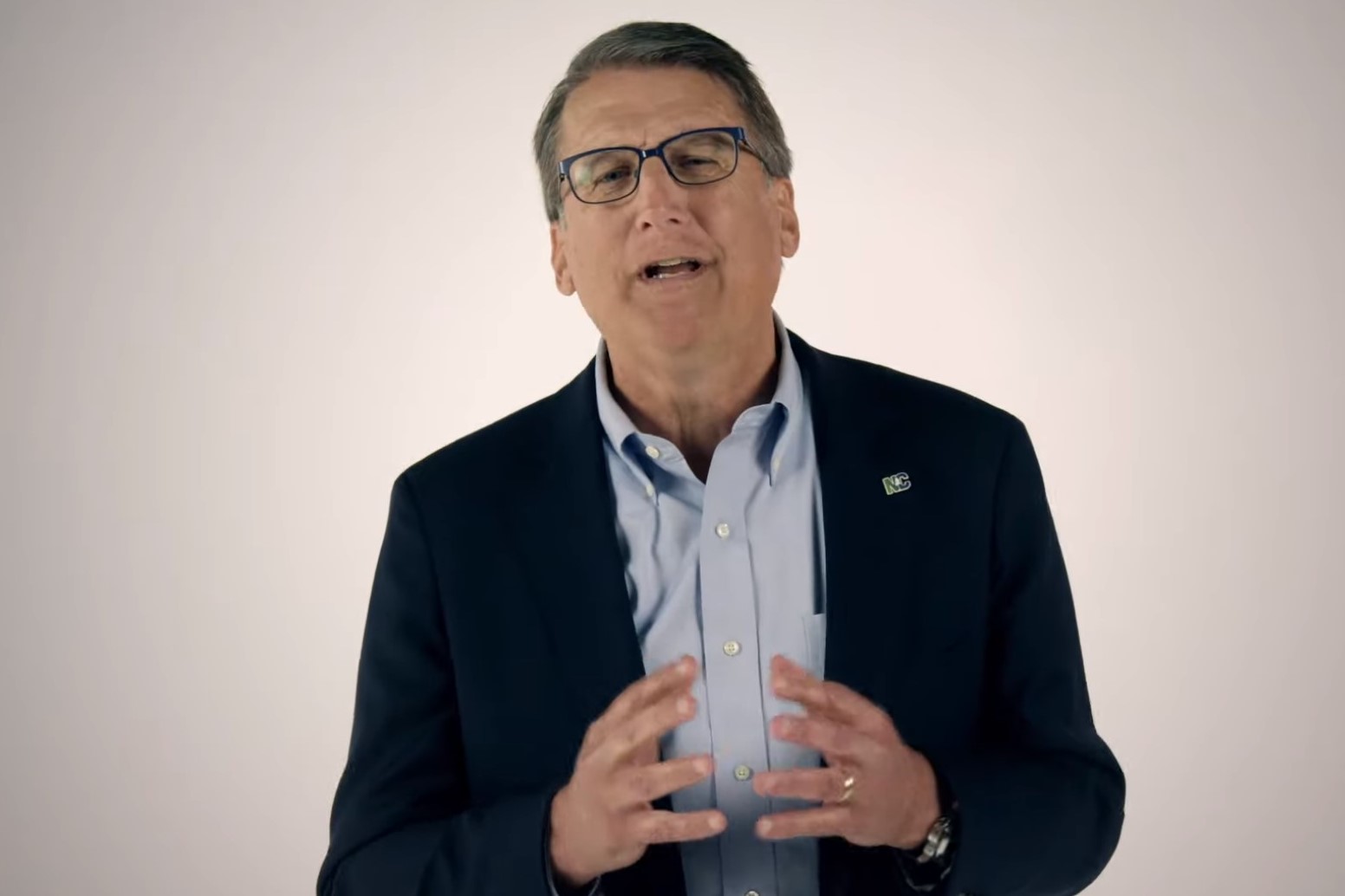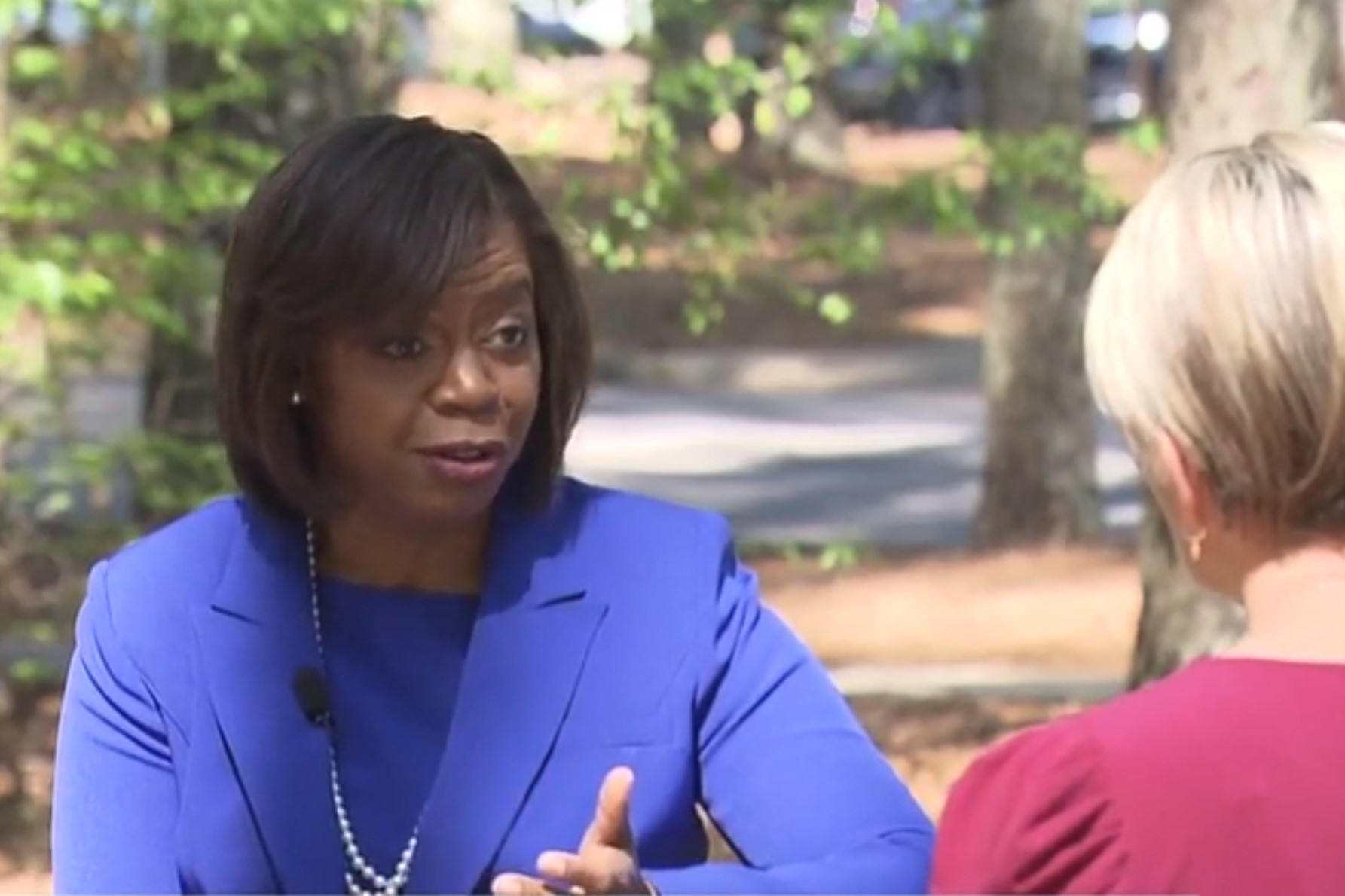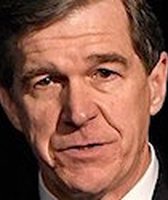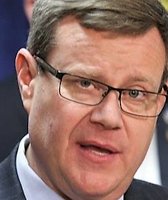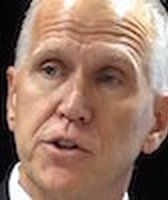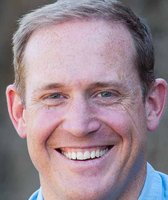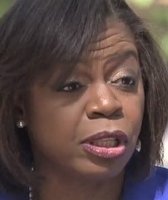Stand up for the facts!
Our only agenda is to publish the truth so you can be an informed participant in democracy.
We need your help.
I would like to contribute
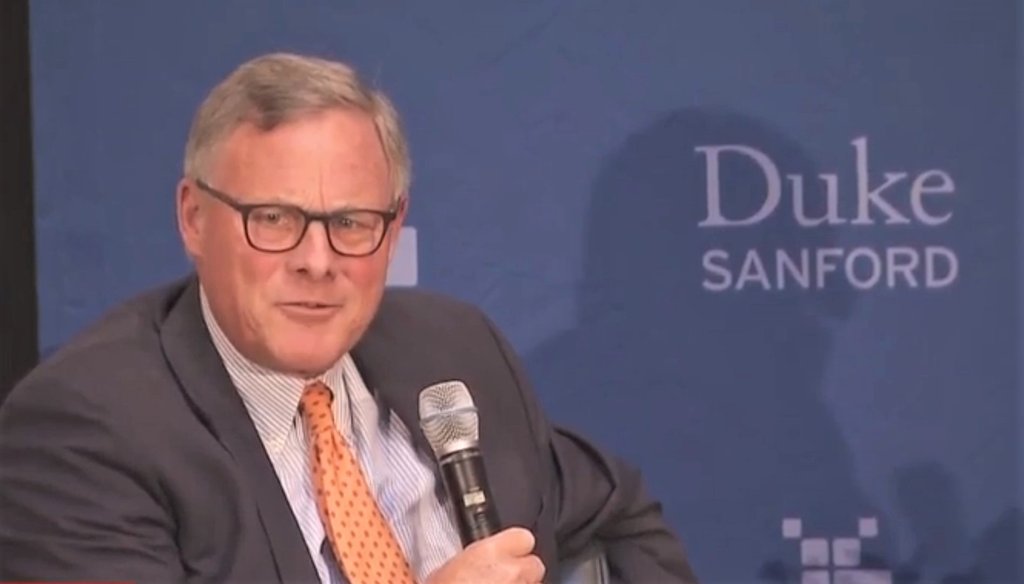
Sen. Richard Burr (R-NC) speaks at Duke University on April 1, 2019. Burr, who has served since 2005, is retiring at the end of his term in 2022. (WRAL screenshot)
North Carolina hasn’t elected a Democrat to the U.S. Senate since 2008 – and the party may need that to change this year in order to keep control of the chamber.
The Senate is evenly divided, and public opinion polling suggests Republicans have the momentum to win a majority in this year’s midterm elections. North Carolina’s seat opened after longtime Republican U.S. Sen. Richard Burr announced his retirement. The primary is May 17.
Eleven Democrats are running, but liberal groups and top politicians have largely coalesced around former state Supreme Court Chief Justice Cheri Beasley, who could become the third Black woman ever to serve in the U.S. Senate. She’ll offer voters a different type of nominee than the one Democrats elected in 2020 in Cal Cunningham, a white male with only two years of experience in elected office. One of the biggest challenges for Beasley, who has never run for federal office, will be gaining recognition against a Republican nominee who will emerge from a hotly-contested primary with months of TV exposure.
The GOP primary, which features 14 candidates, is shaping up to be a heated three-man race and a test of former President Donald Trump’s influence on Republican voters. Pat McCrory, who in 2012 was the first Republican elected North Carolina governor in two decades, is the only U.S. Senate candidate who has won a statewide race. His top opponent is U.S. Rep. Ted Budd, who is endorsed by Trump and supported by the powerful Club for Growth Action political action committee. The group is pouring millions into the race. Former U.S. Rep. Mark Walker, meanwhile, is campaigning as a grassroots favorite more closely aligned with Trump’s policy views. Walker has touted wins in straw polls at the NC GOP convention and at meetings across the state.
"When Trump made his endorsement last summer, the race immediately turned to Budd versus everyone else, with both McCrory and Walker trying to prevent Budd from using the endorsement to gain the necessary 30% to avoid a run-off," said Michael Bitzer, a Catawba College political scientist.
If no candidate surpasses 30%, the two highest vote-getters would advance to a July 26 runoff.
While Budd and his allies say McCrory isn’t conservative enough, the former governor has criticized Budd for his positive remarks about Russian President Vladimir Putin and cast him as a right-wing candidate akin to U.S. Rep. Madison Cawthorn. Walker is campaigning as someone who serves voters, rather than Trump or the GOP establishment. He told WRAL-TV that, during a December meeting at Trump’s Mar-a-Lago resort in Palm Beach, Florida, Trump and a Club for Growth official asked him to drop out of the race.
As of early April, Budd appeared to have a lead. A poll released by The Hill and Emerson College in early April found Budd with 38% support among likely GOP primary voters. McCrory had 22% support and Walker had 9% support from the same group, while 23% said they were undecided. A recent poll by WRAL-TV found Budd with 33% support, McCrory with 23%, Walker with 7%, and 33% undecided.
PolitiFact plans to fact-check candidates for U.S. Senate in multiple key states, including Ohio. If you spot a claim in an ad, speech, debate or on social media that you think may warrant a fact-check, email us at [email protected].
Ted Budd: campaign website
Biography: Budd won his first term in Congress in 2016 after beating out several other Republicans in the GOP primary with help from Club for Growth. During Trump’s presidency, Budd’s votes aligned with his administration about 92% of the time. Budd broke with Trump in 2020 when he voted against a pandemic aid bill, as well as the bill to increase coronavirus-related stimulus payments to $2,000 from $600.
The GOP touts Budd as someone who brings business experience to Washington. He owns a gun store, invested in his father’s agriculture business that went bankrupt, and before that worked for the family’s janitorial and landscaping business.
Core policies: Budd has campaigned on securing the southern U.S. border, fighting what he calls "political censorship" by social media companies and cutting business regulations. On the campaign trail, he has sought to present himself as the most pro-Trump candidate. Budd and Club for Growth have accused McCrory of talking trash about Trump, a topic PolitiFact addressed in a recent fact check and found the claim Mostly False.
Key backers: Trump, Club for Growth, National Border Patrol Council, Gun Owners of America
Pat McCrory: campaign website
Biography: McCrory served seven terms as mayor of Charlotte before running for governor in 2008 and losing to Democrat Bev Perdue in what was the state's closest gubernatorial contest since 1972. McCrory then won the gubernatorial race in 2012 after Perdue declined to seek reelection. As North Carolina’s first Republican governor elected in more than two decades, McCrory and the GOP-controlled legislature ushered in a wave of conservative laws, cutting taxes and business regulations. McCrory likes to talk about his efforts to reduce the state’s unemployment rate, which was 10% when he first took office and less than 5% by the end of his term.
McCrory lost reelection in 2016 to Democrat Roy Cooper, whose campaign attacked McCrory for signing the so-called "bathroom bill." The law, known as HB2, required people to use restrooms at North Carolina schools and government buildings that corresponded to their gender assigned at birth. The bill prompted many businesses to leave the state or halt expansion plans and several athletic organizations to relocate their events.
Outside of politics, McCrory rose up the ranks of Duke Energy during his 28-year tenure at the public utility. He also later joined his brother’s Charlotte-based sales consulting firm. After his 2016 reelection loss, he stayed in GOP voters’ ears through a popular radio show but didn’t necessarily endear himself to Trump’s loyal base of support.
Core policies: McCrory’s campaign website says his priorities are to introduce legislation to fund a wall on the southern U.S. border, introduce a national voter ID requirement, and add an amendment to the U.S. Constitution that requires the federal government to pass a balanced budget. McCrory has slammed Budd and Cawthorn for their comments about the 2020 election and Russia’s invasion of Ukraine. In the process, his campaign has avoided direct criticisms of Trump for similar comments.
Key backers: In an interview with WRAL, McCrory listed Maryland Gov. Larry Hogan, Nebraska Gov. Pete Ricketts and former Tennessee Gov. Bill Haslam as supporters. Campaign finance records show large individual donations from people in the auto, finance and real estate industries.
Mark Walker: campaign website
Biography: Walker, first elected in 2014, served three terms as a congressman before opting against reelection in 2020 after his district was redrawn. After announcing his run for U.S. Senate, Walker considered a run for Congress in the Greensboro area instead as North Carolina’s election districts faced a judicial review. He ultimately decided to preserve his senate campaign, which he says frustrated Republicans who wanted him out of the race.
Walker voted with Trump 94% of the time while in Congress, although he missed votes on a pandemic aid bill and the one to increase coronavirus-related stimulus payments to $2,000 from $600. Walker’s votes most recently broke with Trump in 2019, when he opposed a budget bill and Trump’s withdrawal of troops from Syria. Prior to his time in Congress, Walker served as a pastor.
Core policies: Like Budd and McCrory, Walker says border security and fiscal responsibility are among his top priorities. He’s also campaigning as a bridge-builder and defender of conservative Christian evangelicals. Walker touts awards he received for supporting historically Black colleges and universities. He launched his senate campaign alongside civil rights activist Clarence Henderson, who protested segregation in 1960 with a sit-in at the Woolworth’s lunch counter in Greensboro. Walker has also been a strong supporter of Lt. Gov. Mark Robinson, who has made controversial remarks about the LGBTQ community. In fact, Walker criticized Budd and McCrory for being slow to support Robinson.
Key backers: Cawthorn, former Arkansas Gov. Mike Huckabee, former White House Chief of Staff Mick Mulvaney, Sen. Tim Scott, R-S.C.
Cheri Beasley: campaign website
Biography: Beasley launched her campaign for Senate after losing one of the closest contests in North Carolina history. Beasley, who Cooper appointed as chief justice of the state Supreme Court in 2019, lost that seat to Republican Justice Paul Newby by about 400 votes. Upon entering the Senate race, Beasley’s path to victory wasn’t so clear. State Sen. Jeff Jackson, a Democrat from the Charlotte area and an effective fundraiser, also launched a campaign. Jackson visited all of North Carolina’s 100 counties before abruptly dropping out of the race and endorsing Beasley. He later decided to run for a Charlotte-area congressional seat.
Beasley joined the state’s highest court in 2012 as a justice after previously working as an Associate Judge on the state’s Court of Appeals and a District Court Judge.
Core policies: Beasley’s campaign website says she plans to expand access to health care, stand up for women’s rights, reform the criminal justice system and improve housing affordability, among other things. Republicans have accused Beasley of not being transparent about her views and in the early stages of her campaign she faced criticism for not staking out a firm position on the filibuster, a rule allowing a minority of senators to hold up legislation. She now says she wants to eliminate it.
Key backers: U.S. Rep. David Price, D-N.C.; U.S. Rep. Alma Adams, D-N.C.; U.S. Rep. Deborah Ross, D-N.C.;, reproductive rights group EMILY’s List, and the Congressional Black Caucus political action committee.
Ted Budd: "Pat McCrory appointed the ‘Republican’ judge who sided with Democrats in the partisan Democrat lawsuit/power-grab over redistricting." (Mostly False)
Pat McCrory: "While Ukrainians bled and died, Congressman Budd excused their killer." (Mostly False)
Club for Growth: Audio clips from ad show Pat McCrory supported Black Lives Matter protesters while condemning ‘Trump supporters.’ (Mostly False)
Cheri Beasley: "We need filibuster reform, and I’ve always been very clear about that." (Mostly False)
Pat McCrory: Ted Budd’s family used AgriBioTech money to help "give donations to these Washington special interest groups that are running negative ads against me in the Senate race." (Mostly False)
Mark Walker: Says he worked to pass the 2018 farm bill "that helped farmers, invest(ed) in rural broadband, and added work requirements for able-bodied adults, Budd voted NO." (Half True)
Pat McCrory: "75% of third-graders in this year’s class are not reading at a third grade level" and, for those who don’t catch up, there’s "an 80% chance that you will not graduate." (Half True)
Ted Budd: The Democrats’ voting access bill H.R. 1 "allows minors to vote." (False)
Ted Budd: "There’s about 9% of (the American Rescue Plan) actually going to COVID, meaning 91% of it is not even COVID-related." (Half True)
Mark Walker: "President Biden is raising the prices of insulin and Epi-Pens on those with high costs and the uninsured." (Mostly False)
WRAL State Government Reporter Bryan Anderson contributed.
Our Sources
Stories by WRAL, "Budd leads McCrory in US Senate race, WRAL News poll shows," posted April 11, 2022; "NC GOP's US Senate primary turns personal as Budd, Walker tangle for Trump base," posted March 22, 2022; "Why a group from outside NC is spending millions to influence the state's US Senate race," posted March 20, 2022; "Jackson exit offers clarity, unity for Democrats in fight for US Senate," posted Dec. 16, 2022; "Perdue will not seek re-election," posted Jan. 26, 2012; "Perdue becomes N.C.'s first female governor," posted Nov. 4, 2008.
Story by N.C. Policy Watch, "In three-way GOP Senate battle, Walker courts evangelical vote by embracing Robinson," Oct. 29, 2021.

